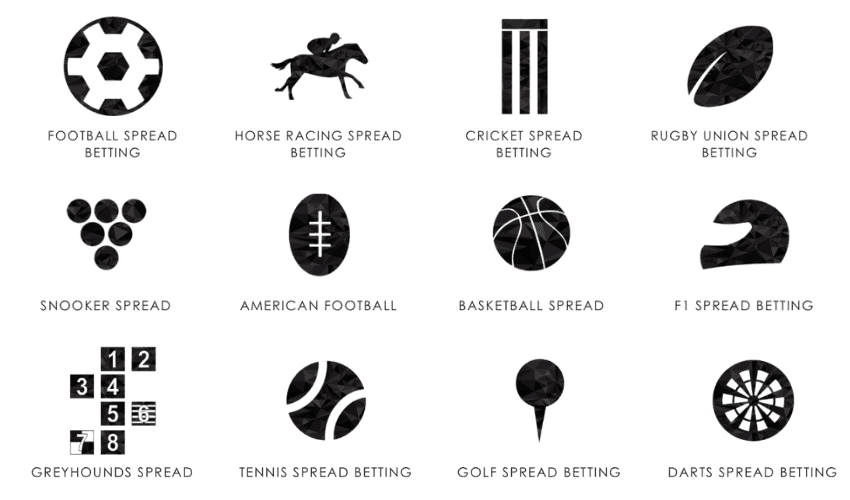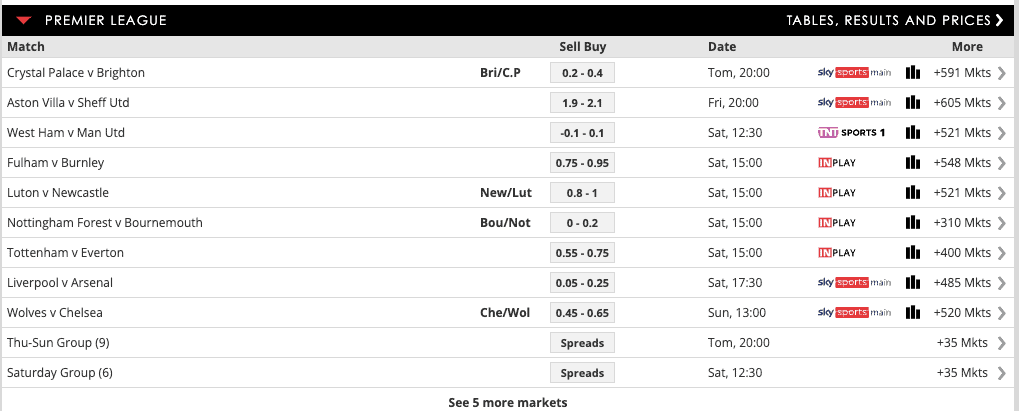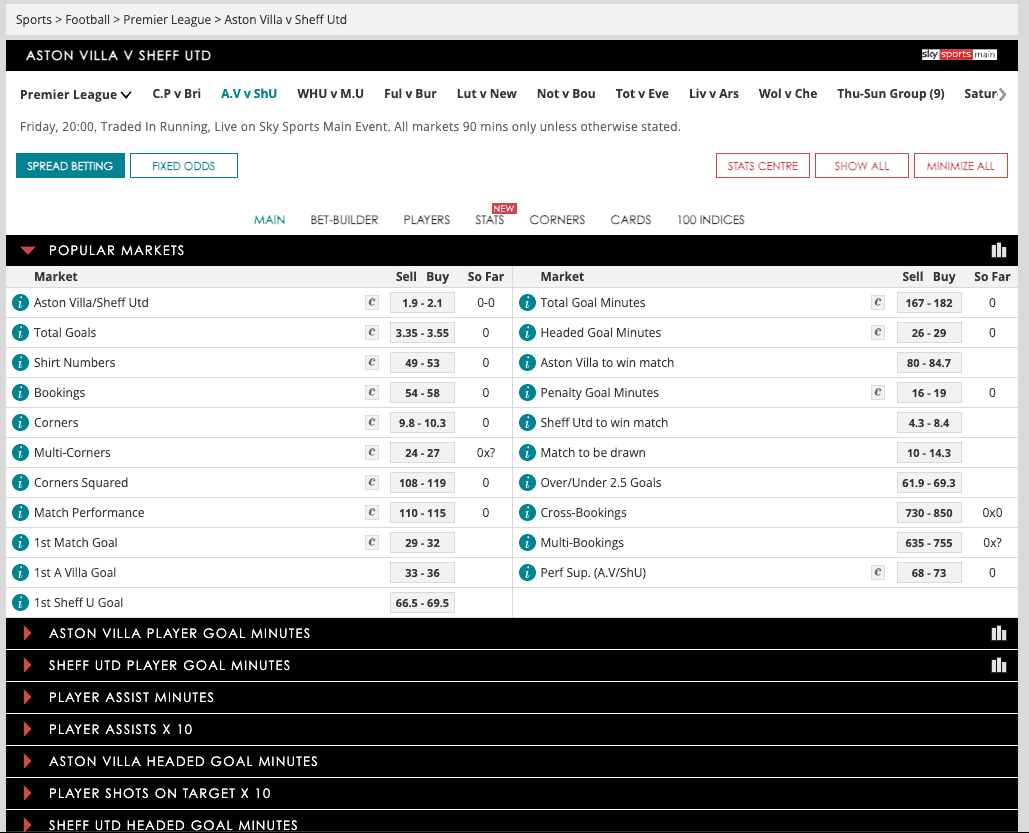In our guide, we examine sports spread betting in the United Kingdom, delving into its principles, tax implications, and the top firms to spread bet with. Additionally, we offer practical evaluations and discuss the advantages and risks of this gambling type.
Sports spread betting works by allowing you to predict which side of the BUY-SELL spread range a sports event will come down on. The more accurate you are with your prediction, and the more you stake, the more you will make if you’re correct.
When making a sports spread bet, you will buy if you think that the spread will rise.
Alternatively, you will sell if you think it will fall.
To activate the bet, you place a stake that you want to risk per point of movement. You will make (or lose) this stake every time the spread goes up or down.
If your prediction is accurate, you’ll make a profit. To understand the scale of this profit, you multiply the number of points the market moved by your stake size.
What Is Sports Spread Betting?
Sports spread betting is a type of wagering on sports events where you can win (or lose) a multiple of your stake, based on the accuracy of your prediction.
You can choose to bet that the event’s outcome will be above the spread (buy), or below the spread (sell). The spread odds are set by the bookmaker, and for every point the market moves, you can make or lose money.
1. Rules
Although sports spread betting is a gambling activity, the Financial Conduct Authority (FCA) regulates spread betting companies as financial service firms. This is because you use margin to open your bets.
The margin is a small deposit the bookie requires so you can open a spread bet. It is used as collateral, just in case the bet loses.
To legally spread bets on sports, you must be over the age of 18 and complete a questionnaire before opening an account. You may find that spread betting companies also offer fixed odds betting, which the Gambling Commission regulates.
2. Types
There are three types of bets available to you.
Point Spread Betting
Points betting is when you bet on a team or athlete to win, and it is usually based on an index of 100. If the team wins, the final result of the bet will be 100. If it loses, the index will be zero.
Totals Betting
Totals betting is a more specific type of spread bet. For instance, you might use this form of betting to predict the total number of points, goals, or corners in a game, although we’ve seen many brokers offer other in-game markets too.
If you buy this spread betting market, you’ll earn your stake size for every point/goal/corner above the spread, over the course of the event.
Supremacy Bets
With supremacy betting, you predict the scale of the victory one team will have over another, hence the name. The greater the winning margin, the greater the profits.
3. Sports
Most spread betting bookies provide over 15 markets. The following are the most popular:
- Football: You’ll be able to spread bet on most of the major leagues around the world. This should also cover a range of different in-game events, like total goals, corners, and number of bookings. You may be able to place pre-event bets, or execute live in-play spread betting.
- Cricket: You can place spread bets on the total number of runs or wickets, and we’ve also seen many brokers offering spread betting on individual player actions, like number of catches.
- Rugby: Spreads may cover the number of overall points, or it may be more specific, like tries and conversions.
- Golf: You can spread bet on the placing of an individual golfer in a tournament, or some brokers other markets, like how many players end up under-par.
- Horse Racing: You can spread bet on the distance between horses in the final placings.

What Are The Advantages Of Sports Spread Betting
There are many advantages to sports spread betting over traditional fixed odds betting. For instance, you can buy or sell markets, unlike fixed odds betting where you can only buy the broker’s odds. We’ve highlighted the main pros and cons of spread betting for you below:
| Pros | Cons |
|---|---|
| Spread betting has greater profit potential than. fixed-odds betting | Your losses can multiply if you are wrong |
| You can exit spread bets early at a loss, preventing potentially greater losses later on | Spread betting prices can be volatile. Big price movements will lead to significant swings in profit or losses |
| There is a wide range of sports spread betting markets, including in-play betting | Can be addictive due to the high-reward possibilities |
| You can bet against the favourite and profit if it loses |
What Are The Risks Of Sport Spread Betting
In our view, the main risk with spread betting on sports is losing money. This is highly possible if an event doesn’t work out in your favour. It’s also possible to lose multiples of your stake in one go, making it a high-risk form of gambling.
Below, we’ve included the main spread betting risks you should be aware of before starting:
1. Potential For Big Losses
With standard fixed-odds betting, you simply stake how much you want to risk, which is your maximum loss. Sports spread betting varies greatly, both in terms of your initial stake size and the spread the broker offers. So there is no standard maximum amount you will risk per spread bet.
If the spread is 50 when you buy the market, it can drop a maximum of 50 points, seriously impacting the funds in your spread betting account.
2. Unexpected Factors
You are betting on a specific outcome within a set time frame, and there are many things that can ruin your spread bet.
For example, if you spread bet on a football player to have two or more shots in a game, but he or she ends up being subbed early, you will lose your bet no matter what. Even if they suffered an unexpected injury after only one minute.
These factors mean that spread betting involves more luck than skill. In this sense, it is a form of gambling and is governed by chance.
3. Emotional Betting
Emotional betting is another risk we think you should consider. You may suffer a series of losses when you gamble, causing an emotional reaction as you try and recover those losses.
Your emotions can get the better of you, especially if you risk money you cannot afford to lose. You may start making poor decisions, or betting on exotic events without knowledge or experience. This can start a spiral of further losses, driven by emotional betting.
4. Betting On Too Many Markets
Hundreds of betting markets are available across many sporting events and leagues. While this might sound like a good level of choice, there is a risk that you end up betting on events you know little about.
For example, you might know a lot about tennis, but find there are currently no tennis events to bet on. So you decide to bet on a cricket match in the Indian Premier League, even though you have no knowledge of the sport or the division.
There’s always an element of luck and chance involved, but if you use your sports spread betting account to chase markets you have no background in, the risks greatly increase.
How Do You Spread Bet On Sports?
Learning how to spread bet on sports can be complicated initially, but once you’ve mastered it the process becomes easy. Below, we explain how to place your first sports spread bet:
1. Choose A Spread Betting Platform
The first step is choosing a sports spread betting firm. There are a few in the UK to choose from, and they offer similar services. If you wish to spread bet on sports and financial markets, then Spreadex is my top pick.
2. Select A Sports Event
The first step is to choose a sports spread betting firm. There are several in the UK to choose from, and many will offer similar services.
At SpreadBet, we typically focus more on financial spread betting markets. If you would like to spread bet on both sports and financial markets, then SpreadEx is our top pick.

3. Choose A Betting Market
After choosing your event, you’ll see different markets to bet on within that event. These may include Total Points, Supremacy or Handicap bets, among others.
Select the market you wish to bet on. For example, a Total Goals market for a football event, or Total Points for an NBA game.

4. Select Buy or Sell
Finally, choose whether you want to Buy or Sell the bet available. Buying the bet means you think the final result will be greater than what the bookmaker offers.

Say the bookmaker thinks there will be one goal in a particular game. If you think there will be more, you would Buy the bet. If there are two or more goals during the game, you can profit on that given market.
Selling the bet is the opposite. It means that you do not believe a given sporting event will reach the threshold specified by the broker.
In the example we gave above, you might believe the game will be a 0-0 draw, so there will be fewer goals in the game than the broker predicts. If the final score is below the broker’s estimate, you can profit.
Your bets will automatically close when the sporting event has finished. Then the profit or loss will be added to, or taken from, your spread betting account shortly after.
Examples Of Sports UK Spread Betting
We have provided a few examples based on the most popular sports to speculate on in the United Kingdom.
1. Example Of A Buy on Football
Let’s look at a spread betting buy example of a football match between Manchester United vs Bayern Munich. You want to bet that Bayern Munich will beat Manchester United.
In this example, the broker sets the ‘win’ result index at 66.7. You buy this result at £1 per point, and Bayern Munich wins the game. As Bayern have won, the final index ends at 100.
You can work out your profit with this formula: subtract the initial index from the final index, and then multiply this by your stake size.
So, 100-66.7 X £1.
This equals £33.30 profit.
However, if the result is a draw or a Manchester United win, you will lose your stake, multiplied by the buy price. This means £1 x 66.7, translating to a £66.70 loss.
2. Example Of A Sell On Football
The bookmaker offers you a spread bet on Aston Villa vs Arsenal. The broker believes there will be more than 2.5 goals in the game. You believe there will be fewer goals than this, so you sell the spread bet at 2.35, and stake £10 per point.
In order to profit here, you’ll need the game to have two goals or fewer.
With this example, your wins are determined by how many goals are scored. If the game ends 0-0, you would win your £10 stake, multiplied by the spread of 2.35. So you’d receive a £23.50 profit.
But let’s say there is one goal scored. In this instance, you’d win your stake but the multiplier would be reduced by one.
The formula is now (2.35-1 = 1.35) X £10. The final profit with one goal scored would be £13.50.
3. Example Of A Winning Bet in NBA
The bookmaker offers you the Total Points market for Charlotte @ Indiana with a buy price of 249, which means you’ll profit if the overall score exceeds 249. You believe the total score will be higher than this, so you place a stake size of £10 per point.
The game ends with a total of 279 points. So your profit is the difference between 279 – 249, which is 30 points.
Because you staked £10 per point, you made £10 x 30 points, giving you a total profit of £300.
4. Example Of A Losing Bet in NBA
Now let’s look at a losing bet in the NBA between New York Knicks @ Brooklyn Nets with a Total Points market priced at 234. You believe the total score will be higher than 234 points overall, so you buy the market at a stake of £10 per point.
The game finishes with a lower score than you expected, 200 points. So you lose on this spread bet. Your losses are the difference between the buy price (234) and the final result (200), giving you a 34-point difference.
The overall loss is your stake size multiplied by the point difference. This is £10 multiplied by 34 points, giving you a £340 loss on this spread bet.
Sports Spread Betting Vs Financial Spread Betting
There are similarities between sports spread betting and financial spread betting in the UK, allowing you to switch between the two markets if you work with a broker who offers both, like SpreadEx.
The main difference is the markets you are betting on. With sports spread betting, you bet on sporting events. With financial markets, you bet on the performance of underlying financial instruments. Both share some similarities and differences, and we’ve outlined these below.
| Feature | Sports Spread Betting | Financial Spread Betting |
|---|---|---|
| Can go long/short a market/ | Yes | Yes |
| Requires margin to bet? | Yes | Yes |
| Markets available | Sports, including basketball, football, and golf | Financial markets, including forex, stocks, indices, and commodities |
| Tax-free? | Yes | Yes |
| Trading Platforms | Proprietary only | Proprietary, MetaTrader 4, MT5, cTrader, TradingView, depending on the broker. |
| Profit/Loss Calculation | Buy Bet: (Close Price – Open Price) x Stake Size | Long: (Close Price – Open Price) x Stake Size |
| Spread Bet Automation? | Sell Bet: (Open Price – Close Price) x Stake Size | Short: (Open Price – Close Price) x Stake Size |
| No | Yes, with MetaTrader 4, MT5, and cTrader platforms |
FAQ
What Is A Stake In Spread Betting?
A stake in spread betting is how much money you want to risk per point.
For example, if you enter a stake size of £5 on a spread bet, then for every point the bet price moves in your favour, you would make £5 profit. If it moves against you, you will lose £5 per point.
Can Spread Betting Be Profitable?
Spread betting can be profitable, but you need to manage your risk and only bet on the sports markets you understand. To become a professional spread bettor, you’ll need to develop a strong strategy over your sports spread betting journey, focusing on markets where you can find value.
What Is +7 Spread?
A +7 spread is a bet you can place on American Football events, in which the team has to win by more than 7 points for you to win the bet. If the team wins by 7 points exactly, you win your money back. If the team fails to win, or wins by less than 7 points, you lose the bet.
You can see how much profit a bet can make you with our handy spread betting calculator, which tells you more about the underlying risk and profit potential.
Is Sports Spread Betting Different To Financial Spread Betting?
Yes, sports spread betting is different from financial spread betting for a number of reasons. One factor is that financial markets can give you a longer timeline for spread betting.
With sports betting, the event expires after full-time – this will be 90 minutes plus injury time for a football game, but will be different for other sports.
Is Sports Spread Betting Regulated?
Sports spread betting is regulated by the Financial Conduct Authority, just like the financial spread betting markets are. The FCA regulates spread betting to ensure that bettors are protected and treated fairly, and that the client’s funds are protected if the company goes bankrupt or if the bettor experiences a heavy loss.
Can You Use Leverage When Sports Spread Betting?
No, sports spread betting does not have leverage. However, you will use the margin as collateral to open a spread bet, ensuring you have enough funds to cover any losses. As the FCA requires negative balance protection, your losses will never exceed your account balance.
Does Taxes Apply For Sports Spread Betting?
Sports spread betting is exempt from capital gains tax as it is classified as a gambling product according to HMRC tax laws. This means you keep 100% of your winnings without filing a tax return at the end of the year.



Ask an Expert
Which is the most profitable sport to bet on?
I wouldn’t say any sport is more profitable than another but relies more on your knowledge of the sport and some luck.
Can I spread bet on things like player performance in sports?
Yes, you can spread bet on individual player stats, like goals scored or tackles made.